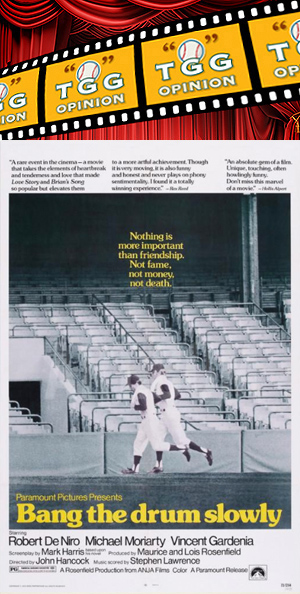TGG OPINIONS
“Bang the Drum Slowly”
The TGG Baseball Movie Review
Borderline major league catcher Robert De Niro discovers he has only months to live—and star teammate Michael Moriarty does all he can to pull his friend through one final hurrah.
From Eric Gouldsberry:
 The game of baseball is many things, chief among them loyalty—and the loyalty of players to one another in particular. Bang the Drum Slowly examines that loyalty in its purest, most non-conditional form.
The game of baseball is many things, chief among them loyalty—and the loyalty of players to one another in particular. Bang the Drum Slowly examines that loyalty in its purest, most non-conditional form.
The film begins with two critical shots: One of a pair of teammates jogging inside an empty ballpark, followed by the same two walking out of the Mayo Clinic, where Lou Gehrig was once told he was afflicted with ALS and didn’t have long to live. We soon discover that one of the teammates, a young catcher named Bruce Pearson, has been told he faces a similar fate after being diagnosed with Hodgkin’s disease.
Pearson’s teammate, good friend and ace pitcher, Henry “Arthur” Wiggen, fears that anyone within management finding out about the condition of Pearson, a “plumb dumb” 50-50 bet just to make the Opening Day roster, will drop him like a rock from the team, because that’s the cold reality of baseball business. For Wiggen, absolute loyalty kicks in; he doesn’t want to see Pearson chucked out of the game and sitting idle, alone and depressed for what little time he has left to live.
So Wiggen does all he can to protect Pearson, to allow him to be happy, hopeful and focused on the game. He insists that his new contract includes a clause that states that if Pearson gets traded or released, he goes with him; he creates a myriad of cover stories that frustrates his colorfully crusty and nosy manager; and, putting on his hat as insurance salesman—his offseason job—he goes against the wishes of Pearson and writes the catcher’s opportunistic girlfriend out as beneficiary, because he knows she’s only in it for the money.
Eventually, the cat is out of the bag as Wiggen’s manager, team owners and other teammates all find out about Pearson. But to Wiggen’s pleasant surprise, as the team bears down on winning a pennant, he discovers that the limits of loyalty doesn’t begin and end with his relationship with Pearson.
The ensuing third act gives Bang the Drum Slowly its strength, bailing out a mediocre first hour that wobbles about with tepid pacing, some unwatchable supporting acting and a lack of cinematic muscle that would have left even the producers of those awful TV “Movies of the Week” from the early 1970s wince.
Critically, Bang the Drum Slowly gets its juice through its three primary characters and the actors who portray them. Pearson is played with innocent flair by Robert De Niro, whose southern drawl and doo-wap hair style make him look like he’s warming up for his turn as Max Cady in Cape Fear, minus the creepy intellect. (In truth, De Niro was warming up for his next three roles, all of them groundbreaking: The rough-and-tumble Johnny Boy from Mean Streets, the young Vito Corleone from The Godfather, Part II, and the infamous Travis Bickle from Taxi Driver.)
There’s Vincent Gardenia, who as suspicious manager Dutch Schnell plays the type of character he almost always does, an energetic ball of irritating fire and fury that leaves players uncertain as to whether to fear his rants—or chuckle at them. One wonders, between Schnell and Tommy Lasorda, who inspired who.
But with due respect to the emerging legend that was De Niro and the Oscar-nominated performance of Gardenia, Michael Moriarty emerges as the rock of Bang the Drum Slowly. As Wiggen, Moriarty provides a wary but calm, poker-faced facade as he’s forced to deftly tiptoe through the minefield of rumor and accusation to keep Pearson insulated from a potential emotional crisis.
Filmed at the original Yankee Stadium and (mostly) Shea Stadium, Bang the Drum Slowly exposes good insight into the culture of baseball before the advent of free agency, best exemplified by Wiggen’s need to maintain an offseason job as an insurance agent. The clubhouse camaraderie takes on a modern bent, with eclectic personalities, Spanish translations and even a singing performance by team players on a TV show that channels the Cubs performing Go Cubs Go on Saturday Night Live 40 years into the future.
On the field, the baseball scenes are well staged, blurring in actual major league footage—but it’s tough to call this team the New York Mammoths when they’re basically wearing the jerseys and caps of the Yankees, while playing regular season contests against teams like the Pittsburgh Pirates and Cincinnati Reds, long before interleague play began. But hey, forget it. It’s all background.
 Bang the Drum Slowly is based on the 1956 novel of the same name; Mark Harris, its writer, penned the screenplay. Its director is John Hancock, whose Hollywood signature (I couldn’t resist) was at its most flourished during the 1970s, from the thriller Let’s Scare Jessica to Death to the sexy surfer flick California Dreaming, one of my favorite drive-in films from back in the day.
Bang the Drum Slowly is based on the 1956 novel of the same name; Mark Harris, its writer, penned the screenplay. Its director is John Hancock, whose Hollywood signature (I couldn’t resist) was at its most flourished during the 1970s, from the thriller Let’s Scare Jessica to Death to the sexy surfer flick California Dreaming, one of my favorite drive-in films from back in the day.
As a baseball parable to the more familiar football tearjerker Brian’s Song, Bang the Drum Slowly will reward those who endure through some early choppy waters and stick it out to the end.
From Ed Attanasio:
My review for this film might as well be entitled Bang the Drum Partially, because for many years I watched portions of this film when it came on TV. Every time, it became so depressing, that I had to turn it off.
If the focus of any film deals with disease or if the main character is sick throughout the movie, I am out. Life is too short to dwell on people getting sick, and I surely don’t want to walk out of a movie theater bummed out by the story. I understand that bad things happen to good people every day, but I don’t want to sit there and spend two hours watching it. So, I am already biased about Bang the Drum Slowly, so this review is going to be me trying to find some good things about it.
First off, I love Robert De Niro in almost everything he’s ever been in, except for Dirty Grandpa, but everyone makes mistakes, even the great ones. So, seeing a young De Niro playing Bruce Pearson—an unintelligent, lovable character who is on death row from the beginning of the film—is much different than playing the young Don Corleone in The Godfather, Part II, but it’s an outstanding performance nonetheless.
The best thing in Bang the Drum Slowly is Vincent Gardenia, who plays New York Mammoths manager Dutch Schnell. A fidgety, hyper-paranoid manager who reminds me of Casey Stengel on medical marijuana, Gardenia is the best part of the film. He was Oscar-nominated for the performance, but lost to John Houseman, who played a different type of taskmaster in the movie The Paper Chase.
Another familiar face I noticed in the film was Danny Aiello and of course, I recognized both Shea and Yankee Stadium. I had no issues with the believability of the baseball scenes, even though they used fairly obvious clips from an old World Series that were dropped in.
Some people might say that in Bang the Drum Slowly, this great game is used to convey heavy themes about dying with dignity and respecting our fellow man. Star pitcher Henry Wiggen (played by Michael Moriarty and reportedly modeled after Terrific Tom Seaver) does a gracious thing when he makes sure that Pearson gets to enjoy the celebrity that comes with stellar play. When the team finds out Pearson is dying, it motivates them to rally around their sick teammate to win the pennant, which is also a very sweet and selfless thing to do. Those storylines are heartwarming indeed, but knowing that the main character is literally sitting on death row, I can’t get too warm and fuzzy about the endearing parts of the plot.
Like a kid getting his final wish through Make-A-Wish Foundation, Pearson gets a taste of fame and winning as part of his last hurrah. When I see Pearson’s meteoric path to stardom, it reminds me of players that appeared out of nowhere to win big games—like Mark Lemke, Chuck Essegian and Gene Tenace, to name a few. These players faded into the background after getting their 15 innings of fame and Pearson too will fade, but through another exit.
 Except for Wiggin and Pearson, the movie does not develop any of the other relationships in the film, so we end up with more questions than answers. As a result, Bang the Drum Slowly misses a lot of bases and leaves us with a minor league story trying to succeed in the Show. It’s too predictable, overly sentimental and slow-paced, like an extra-inning game where everybody keeps hitting into double plays and managers switch pitchers every three batters. It has a few nice spots and overall it’s a touching film, but it ends up being depressing and that is the one thing I can’t forget about Bang the Drum Slowly. If I want to be depressed, I’ll become a fan of the last-place San Francisco Giants!
Except for Wiggin and Pearson, the movie does not develop any of the other relationships in the film, so we end up with more questions than answers. As a result, Bang the Drum Slowly misses a lot of bases and leaves us with a minor league story trying to succeed in the Show. It’s too predictable, overly sentimental and slow-paced, like an extra-inning game where everybody keeps hitting into double plays and managers switch pitchers every three batters. It has a few nice spots and overall it’s a touching film, but it ends up being depressing and that is the one thing I can’t forget about Bang the Drum Slowly. If I want to be depressed, I’ll become a fan of the last-place San Francisco Giants!




